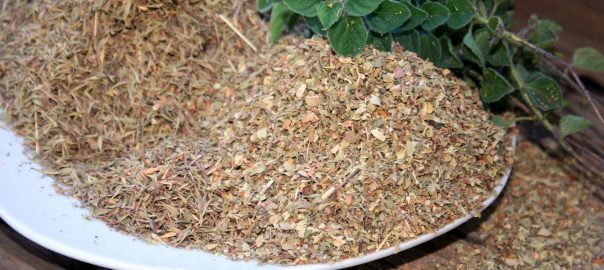When it comes to fresh product most of us think fruits and vegetables. Not everyone remembers to include herbs in that category, however they are a great added source of nutrients. Herbs boost nutrition because they are a nutrient dense food with vitamins and minerals. Many of them are even a source of anti-oxidants. Aim for 2-4 tablespoons of herbs per day for a healthy boost to your diet.
fresh vs. dry
When using herbs it's important to remember that there is a big difference between fresh and dry. The ratio is one to three; one part dry or three parts fresh. So if a recipe calls for 1 tablespoon of fresh herb (such as basil) you can substitute 1 teaspoon of dry. Remember there are 3 teaspoons in a tablespoon. Be sure to read your recipe carefully and scale up or down properly.
nutrition boosts
As mentioned above, different herbs have different nutrient values. The table below shares the health boosting properties of ten common herbs used in the kitchen.
| Herb |
Nutrition |
Health Benefits |
|
|
high in vitamins C, K, and iron, this is also an antioxidant and a powerful detoxifier
|
an immune system booster, parsley is supportive for bones, the nervous system. also beneficial for kidney health and blood pressure
|
|
|
high in vitamin K, highly antioxidant and anti-inflammatory
|
memory enhancing benefits
|
|
|
rich in vitamins B6, C, A, folate, calcium, iron, and potassium, is also highly anti-inflammatory and antiseptic
|
beneficial to reduce swelling and aching, rosemary has also been shown to soothe an upset stomach. studies also show it's benefits for lowering the risk of asthma, liver disease, gum disease, and heart disease
|
|
|
contains vitamin C, iron, and manganese with anti-microbial, antibacterial, and anti-parasitic qualities
|
studies show thyme is supportive for coughing, bronchitis, chest congestion, and other respiratory ailments
|
|
|
a good source of vitamin K, iron, manganese, and calcium. a good source of antioxidants, oregano is also antibacterial, anti-fungal, and anti-parasitic
|
supportive for relieving colds and congestion. also shown to be helpful against menstrual cramps, fatigue, bloating, and acne
|
|
|
a rich source of vitamin C
|
stimulates and supports the digestive system and has been shown to be beneficial for flatulence and constipation. also beneficial for oral health and supporting gums
|
|
|
high in vitamin C and manganese, a good antibacterial herb
|
supportive for bladder health, dill is also a natural diuretic. appeas to be effective for supporting blood sugar levels and reducing cholesterol
|
|
|
rich in vitamins A, K, and manganese as well as having antioxidant and anti-inflammatory properties
|
supportive for digestion, basil also has been shown to reduce swelling and pain in joints, to promote circulation, and is a mild diuretic
|
|
|
contains vitamins A, C and folate
|
has benefits for digestive support against gas, upset stomach, and indigestion. studies have also shown benefits for congestion
|
|
|
good source of vitamins K, A, and C, cilantro is highly antioxidant, antibacterial and a power detoxifier
|
studies have shown benefits for blood sugar and cholesterol levels
|
growing herbs
Many herbs are easy to grow at home. They can be grown either in a container or directly in the garden. The infographic below provides planting instructions, flavor profiles, and suggested uses. Add a nutrient and flavor boost to your diet by incorporating herbs.

“Herb Your Enthusiasm” on Health Perch



